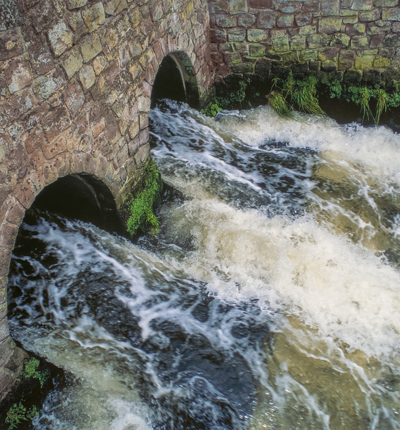
UK Supreme Court holds that water companies can be liable for sewage pollution of UK waters
Leigh Day environmental private law partner Oliver Holland and associates Celine O’Donovan and Benji Gourgey on the Supreme Court’s judgment on the liability of water companies for discharging sewage, and the wider impact of the decision on the environmental issues facing the UK.
Posted on 02 July 2024
In June 2022, the UK Court of Appeal held that sewage companies could not be liable to private citizens for discharging sewage into watercourses without negligence or deliberate wrongdoing. This meant that it was very difficult for private citizens to bring legal actions against water companies for polluting UK waters with sewage.
Today, with sewage pollution of UK waters having become one of the most high profile environmental issues in the country, the UK Supreme Court has overturned this ruling.
The Supreme Court has held that private citizens can bring actions under the laws of nuisance or trespass in respect of polluting discharges, even if there has been no negligence or misconduct. This is a seismic decision and one that will mean private law will have a crucial role to play in protecting the rights of private landowners from being infringed by sewage companies.
The facts of the case will be strikingly familiar to those who have been affected by the sewage pollution of UK watercourses. United Utilities Water Limited ("United Utilities") owns a network of sewers and drains across the North West of England, some of which directly or indirectly discharge sewage into the Manchester Ship Canal, which runs from Manchester to the Mersey Estuary. There is a complex web of statutes regulating the consolidation and privatisation of the UK's sewage system, with these statutes authorising discharges of treated sewage. However, United Utilities was accused of unauthorised discharges of untreated or inadequately treated sewage which had lowered the water quality of the canal. The question before the Supreme Court was whether United Utilities could be liable to the canal's owner, The Manchester Ship Canal Company Limited ("Manchester Ship Canal Company").
Manchester Ship Canal Company, and a coalition of NGOs and other bodies aiming to protect water quality, argued that sewage pollution was a form of trespass and nuisance that created common law liability for the pollution of the canal. In response, United Utilities argued in line with the Court of Appeal decision that unlike a normal private citizen, a water company could not be liable for sewage pollution that rested on the inadequacy of the sewage system. This would be incompatible with the Water Industry Act 1991 (the “1991 Act”), which empowered the Secretary of State to order Water Companies to develop their sewage systems, subject to consideration of wider policy issues such as the impact of investment of regional water bills.
In a landmark ruling, the Supreme Court has found that the 1991 Act “contains no express ouster of all common law causes of action and remedies to protect the enjoyment of the property”. This means that claims of nuisance or trespass are not 'inconsistent’ with the 1991 Act and can therefore be brought by private citizens against water companies. On this basis, the Supreme Court went on to hold that as United Utilities were responsible for discharges of noxious effluent into watercourses, and such discharges could give rise to causes of action in nuisance and trespass, a common law right of action could be brought.
This decision could not have come soon enough, reaffirming the rights of private citizens affected by sewage pollution and setting out the wider role of the courts in protecting the UK's environment at a time when many of the UK's waterways are in crisis. Salmon were declared endangered in the UK this year. The conservation status of one of the UK's most iconic rivers, the River Wye, was downgraded to "unfavourable - declining" in 2023. There were sickness outbreaks among athletes swimming in the Thames or off the Sunderland coast the last two summers. The pollution in the beautiful and ecologically vital lakes Windermere, Neagh and Ness are reaching critical levels. People across the UK are worried they cannot enjoy our rivers and seas in case their children or dogs become ill, and local authorities and regulators regularly issue health warnings against bathing. Our regulators and governments have been too slow to respond to this fast-growing environmental injustice, and this Supreme Court decision sends a message that the common law will not allow individuals to be left without a remedy.
Leigh Day's environmental private law team have a long history of holding water polluters to account on behalf of communities affected by mass pollution. In the UK, Leigh Day is representing wild swimmer and environmental campaigner Jo Bateman against South West Water in Exmouth over allegations their pollution made the waters off Exmouth beach unsafe to swim in. Leigh Day is also representing members of the community of the polluted River Wye catchment against members of the U.S. Cargill group for the environmental destruction allegedly caused by their large-scale industrial poultry operations.
Claims like these are paving the way for more litigations by UK communities being affected by sewage, fertiliser run-off, fish farm pesticides, PFAS, and pharmaceuticals. Now more than ever is the time for legal action in the UK to safeguard our waters, and the wildlife and communities they support. Leigh Day as a firm is committed to fighting for justice on behalf of communities whose lives and livelihoods have been impacted by large-scale polluters. If you are being affected by water pollution, find out more on our website about the work we have done and how we might be able to help you, or contact us below:




